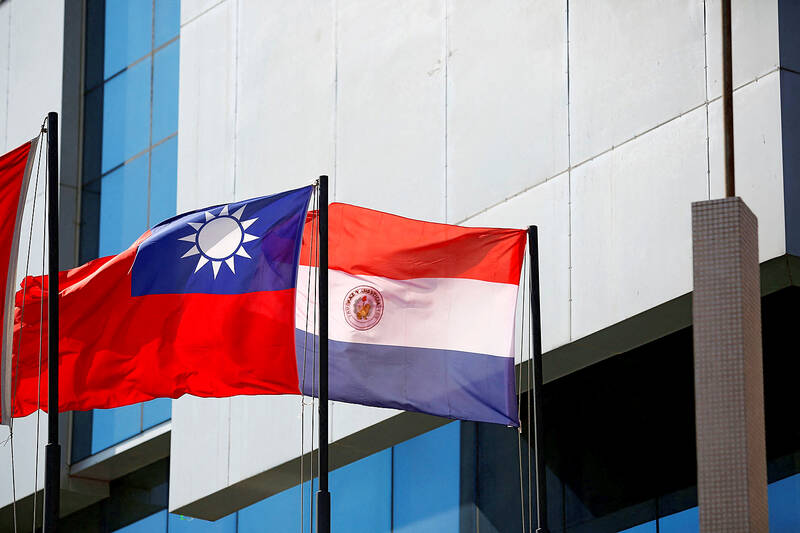Beijing is attempting to influence the Paraguayan government to switch diplomatic recognition from Taiwan to China, former Japanese ambassador to Paraguay Yoshie Nakatani said in a media interview published last week.
One such attempt was during the COVID-19 pandemic, in which Beijing attempted to pressure Asuncion to switch recognition to China by leveraging access to vaccines, Nakatani was quoted as saying by the Japanese-language Sankei Shimbun in an interview published on Thursday last week.
At the time, Beijing prioritized providing China-made vaccines to countries with official diplomatic ties, Nakatani said, adding that at one point Paraguay was the country with the lowest vaccination rate.

Photo: Reuters
China offered to provide Asuncion with cheaper vaccines in exchange for Paraguay switching its recognition from Taipei to Beijing, but the South American country adamantly rejected the offer, she said.
Beijing also attempted to pressure Paraguayan provincial governors to buy its vaccines, but the attempt failed as Asuncion had implemented state-only purchase policies, she said.
Diplomatic envoys stationed in Asuncion paid close attention to protests that erupted following the implementation of the policies, in which some people called for the then-Paraguayan president’s unseating, and the envoys were concerned about a possible change in administration, she said.
The Paraguayan government survived the protests and obtained vaccines from Chile, Nakatani said.
She worked closely with the Taiwanese and US ambassadors to Paraguay to develop solutions to prevent Asuncion from siding with Beijing, Nakatani was quoted as saying.
Taiwan did not have ways to provide vaccines at the time, so it instead provided medical equipment and oxygen tanks, while the US also provided medical equipment, sick beds and tents, she said.
Tokyo, together with UNICEF, provided large storage facilities for vaccines and helped Asuncion manage vaccines, develop a vaccination plan and train personnel, Nakatani said.
She also said that last year Chinese diplomat Xu Wei (徐偉) was declared persona non grata and given 24 hours to leave the country “over interference in internal affairs.”
Xu entered Paraguay, reportedly to attend a UNESCO meeting in December last year, but skipped the UNESCO session and visited the Paraguayan Congress, calling on Asuncion to renounce its recognition of Taiwan.
Paraguay is the only nation in South America and one of 12 countries worldwide that formally recognize Taiwan.
Asuncion was entirely entitled to revoke Xu’s visa, not because of what he had said, but because his actions contravened the stated intent of his visit to Paraguay, Nakatani said.

Taiwan is to commence mass production of the Tien Kung (天弓, “Sky Bow”) III, IV and V missiles by the second quarter of this year if the legislature approves the government’s NT$1.25 trillion (US$39.78 billion) special defense budget, an official said yesterday. Commenting on condition of anonymity, a defense official with knowledge of the matter said that the advanced systems are expected to provide crucial capabilities against ballistic and cruise missiles for the proposed “T-Dome,” an advanced, multi-layered air defense network. The Tien Kung III is an air defense missile with a maximum interception altitude of 35km. The Tien Kung IV and V

The disruption of 941 flights in and out of Taiwan due to China’s large-scale military exercises was no accident, but rather the result of a “quasi-blockade” used to simulate creating the air and sea routes needed for an amphibious landing, a military expert said. The disruptions occurred on Tuesday and lasted about 10 hours as China conducted live-fire drills in the Taiwan Strait. The Civil Aviation Administration (CAA) said the exercises affected 857 international flights and 84 domestic flights, affecting more than 100,000 travelers. Su Tzu-yun (蘇紫雲), a research fellow at the government-sponsored Institute for National Defense and Security Research, said the air

A strong continental cold air mass is to bring pollutants to Taiwan from tomorrow, the Ministry of Environment said today, as it issued an “orange” air quality alert for most of the country. All of Taiwan except for Hualien and Taitung counties is to be under an “orange” air quality alert tomorrow, indicating air quality that is unhealthy for sensitive groups. In China, areas from Shandong to Shanghai have been enveloped in haze since Saturday, the ministry said in a news release. Yesterday, hourly concentrations of PM2.5 in these areas ranged from 65 to 160 micrograms per cubic meter (mg/m³), and pollutants were

Taiwan’s armed forces have established response protocols for a wide range of sudden contingencies, including the “Wan Chun Plan” to protect the head of state, the Ministry of Defense (MND) said today. After US President Donald Trump on Saturday launched a series of airstrikes in Venezuela and kidnapped Venezuelan President Nicolas Maduro, concerns have been raised as to whether China would launch a similar “decapitation strike” on Taiwan. The armed forces regularly coordinate with relevant agencies and practice drills to ensure preparedness for a wide range of scenarios, Vice Minister of National Defense Hsu Szu-chien (徐斯儉) told reporters before a